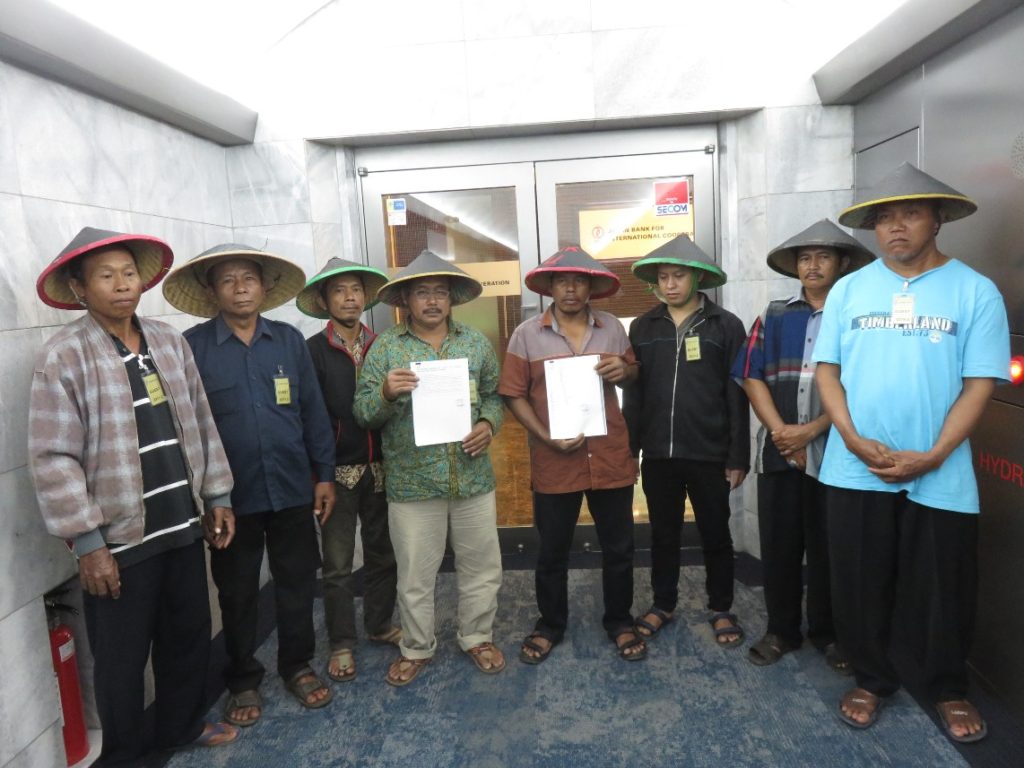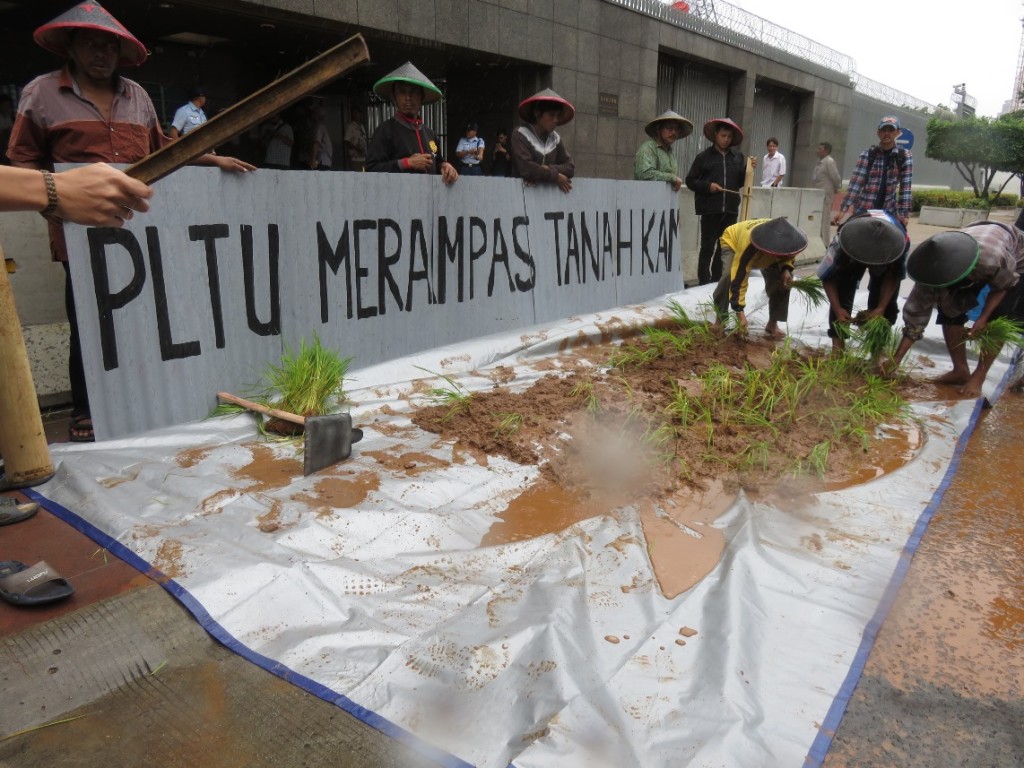12月5日、日本の官民が連携して推進している「インドネシア・中ジャワ州バタン石炭火力発電事業」(※)に5年間反対し続けてきた住民のリーダー11名が、今年6月に約21億ドルもの巨額融資を決定した国際協力銀行(JBIC。日本政府100%出資)のジャカルタ事務所を訪問。本事業がすでに深刻な生活破壊と人権侵害を引き起こしており、『JBIC環境社会ガイドライン』に違反しているとして、工事の即時中止と農地・漁場の回復、また、住民との直接対話を通じた同ガイドライン違反の精査とJBICの融資決定の再考を求める「異議申立書」(18名が代表して署名。900名を超える住民が同申立書への支持を示す署名も添付)を提出しました。
また同日、住民と現地NGOは日本大使館前でも抗議アクションを決行。事業者が立てたフェンスによって事業予定地内の農地に行けなくなった様子を再現しながら、住民の生活を破壊し、気候変動に甚大な影響をもたらす石炭火力発電事業への支援を日本が直ちに止めるよう求めました。
同事業は生計手段や健康への影響を懸念する住民らが反対運動を根強く続け、4年近く着工が遅れてきました。また、用地買収の過程で軍・警察等の脅迫や反対派住民への暴力・不当逮捕・嫌がらせなど深刻な人権侵害も起き、インドネシアの独立した政府機関である国家人権委員会が人権状況の改善を求める勧告を複数回にわたり発出。こうした状況下でのJBICの融資決定には、国内外から強い抗議の声があげられていました。
JBICの融資決定後、事業予定地では工事作業が着々と進められているものの、地元住民は事業への強い反対の意思を示し続けています。農地がフェンスで囲まれてしまったため農業ができなくなった農民は非常に厳しい生活を強いられていますが、少なくとも46名の地権者は依然として土地売却を拒否。事業者側による土地の強制収用後も土地補償金の受領を拒否しています。また、沿岸での埠頭の建設が始まり、漁場への影響も顕著になってきているなか、漁民は同事業に対する抗議アクションを繰り返し行なっています。事業への反対を続けている農民・漁民は、今回のJBICに対する異議申立書のなかでも要求しているとおり、自分たちの生活の糧である農地・漁場の原状回復を望み、これまでと同様の生活を続けたいと訴えています。
JBICに対する住民の異議申立ては、先月、生計手段や健康への影響を指摘した西ジャワ州チレボン石炭火力発電事業(既設660MW、新設計画1000MW)に続き、2件目となります。(注:チレボンの申立てについては、現在、JBIC異議申立審査役が予備調査中。予備調査後の本調査で、同審査役が3ヶ月以内にJBICガイドライン違反等の調査報告をまとめることになっている。)
日本政府・JBICは、バタンやチレボン住民の異議申立てを真摯に受け止め、これまでに起きている問題の解決を図るとともに、地元住民の懸念、また、国内外からの指摘を軽視することなく、新設の石炭火力発電所建設に対する融資を早急に見直すべきです。
(※)インドネシア・中ジャワ州バタン石炭火力発電事業
電源開発(J-POWER)と伊藤忠が参画を決定。総額約45億米ドルかかると見込まれている資金のうち約34億ドルを国際協力銀行(JBIC)・民間銀行団が融資(うちJBICは約60% にあたる約 21億ドル)。建設されると東南アジア最大級の石炭火力発電所(1,000MW×2基)となる。(詳しくは、JBICが支援する石炭火力発電所事業の概要と問題を参照ください。)
本件に関するお問い合せは
国際環境NGO FoE Japan(担当:波多江)
インドネシア携帯:+62 812 1004 6756 E-mail:hatae@foejapan.org
Indonesian Batang Villagers Filed the Objection against JBIC
“Coal-fired Power Project Made Our Life Worse and Caused Human Rights Violations”
Stop the Construction and Restore the Farmland and Fishing Grounds!
December 5, 2016
On December 5, eleven local community leaders, who has continued to oppose “Batang Coal-fired Power Plant Project” (*) for five years, visited the Japan Bank for International Cooperation (JBIC) Jakarta office and submitted their objection against JBIC (18 villagers signed on it as community representatives. The signatures of more than 900 villagers who supported this objection were attached, too.) In the objection paper, the villagers pointed out that the project has failed to comply with “JBIC Guidelines for Confirmation of Environmental and Social Considerations” as it has made their life worse and has caused the violations of human rights. Also, they requested the immediate stop of any construction work and the restoration of their farmland and fishing grounds, and urged JBIC to carefully investigate the violations of its Guidelines through direct dialogue with the project-affected community and to reconsider its decision to provide the loan for this project. In June 2016, JBIC decided to provide the huge loan (around USD 2.1 billion) for this project, which Japanese public and private sectors are pushing through.
The villagers and local NGO also took their protest action in front of Japanese Embassy, playing to show the situation that the farmers were deprived of their access to their farmland due to the fence surrounding the proposed project site. They called on Japanese government to immediately stop supporting for coal-fired power plant projects which destroy the local people’s life and cause huge impacts on global climate change.
The project has faced the strong opposition of the local community who are concerned about the impact on livelihoods and health, and the commencement of the construction was postponed for almost 4 years. In addition, the National Human Rights Commission (NHRC), an independent government agency in Indonesia, issued its recommendations several times, urging the project proponents to improve the conditions of human rights related to the project, as serious human rights violations occurred against the community leaders opposing the project and landowners refusing to sell their land in the proposed project site, such as intimidation, violence, arbitrary arrest and harassment at the hands of the army, the police, and other actors. Thus, domestic and international civil societies have strongly objected to JBIC’s decision to provide its loan for the project last June 2016.
Even after JBIC’s decision, the local community has continuously expressed their strong opposition against the project, while the construction work is pushed through in the proposed project site. The farmers are suffering from very severe life conditions due to the loss of livelihood, or farmland, after the fence was established surrounding the proposed project site. Nevertheless, at least 46 landowners have refused selling their land for the project and have refused receiving the compensation for land till today even after the forcible land acquisition by the project proponents. Also, the fishermen have repeatedly taken their protest actions, while the construction of a jetty facility has been commenced, which has started to cause some clear impacts on fishery. As requesting in their objection against JBIC, the farmers and fishermen, who are continuously opposing the project, are wishing the restoration of their livelihood, or their farmland and fishing grounds, from the bottom of their hearts, so that they can continue the same life as before.
This is the 2nd project on which the local community filed the objection against JBIC, following the Cirebon Coal-fired Power Plant Project (The capacity of the 1st existing plant is 660 MW. The one of the proposed expansion plant is 1000 MW.) last month, where the affected villagers also pointed out the serious impacts on their livelihood and health. (The objection case on the Cirebon project is currently under the preliminary investigation by the JBIC’s Examiners, which is supposedly followed by the main investigation. In the main investigation, the Examiners are supposed to make an investigation report on the compliance of JBIC Guidelines etc. within 3 months.)
Japanese government and JBIC must solve the existing problems, sincerely accepting the Objections from the local villagers of Batang and Cirebon, and must immediately stop its support or finance for any new coal-fired power plant, not ignoring the concerns and voices of the local people and international civil societies.
(*) Batang Coal-fired Power Plant Project, Central Java, Indonesia
Two Japanese companies, J-POWER and ITOCHU, have invested in the project. Japan Bank for International Cooperation (JBIC) and private banks have decided to provide the loan (around USD 3.4 billion) for the project (JBIC’s part is around 60 %, or around USD 2.1 billion. The entire project cost is approximately USD 4.5 billion.). If built, the power plants (2,000 MW) will be one of the biggest coal-fired power plants in Southeast Asia. See more details (only available in Japanese)
Reference
Summary of Objection Procedures Based on JBIC Guidelines for Confirmation of Environmental and Social Considerations (Link)
(signed by 18 residents)



